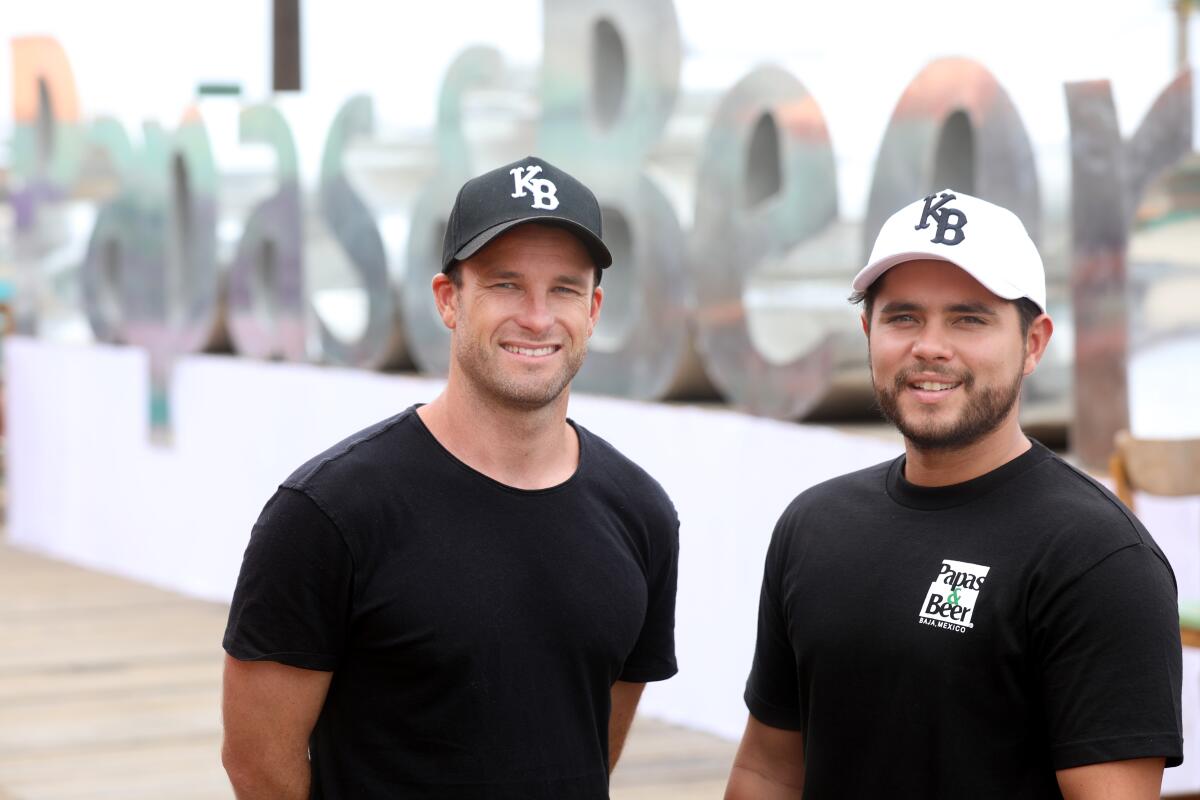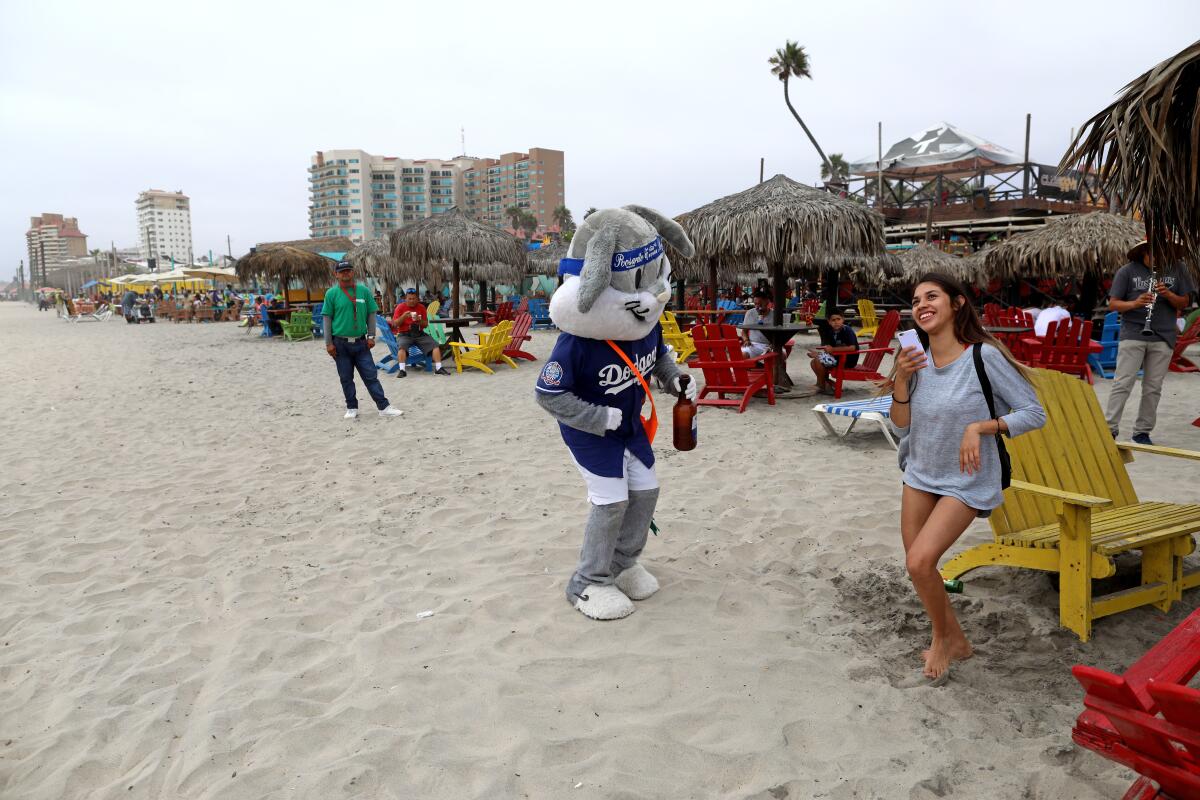How an upstart Latin music fest is reviving a once-glamorous Baja beach town
- Share via
ROSARITO, Mexico — The organizers of this weekend’s Baja Beach Fest in Rosarito, Mexico, had a clear goal in mind for their second annual event: booking Bad Bunny and Ozuna — two Puerto Rican superstars at the red-hot center of the booming Latin-pop scene — on the same bill.
“They both think they’re the biggest guy in the space,” said Chris Den Uijl, 32, who co-founded the music festival last year with his business partner, Aaron Ampudia, 26. “So getting the two of them to play together — that was the challenge we set ourselves.”
In that regard, the sold-out show is already a success: Ozuna and Bad Bunny are among the two-dozen acts scheduled to perform Friday and Saturday in this coastal resort town about 30 minutes south of the border. Set to take place on a plot of white sand near Papas & Beer, the popular Rosarito nightspot owned by Ampudia’s family, Baja Beach Fest will also feature appearances by J Balvin, Nicky Jam and Becky G; as a whole, the lineup offers an impressive survey of the fast-evolving Spanish-language styles, including reggaeton and Latin trap, known collectively as urbano.
“I’ve been looking forward to the Baja Beach Fest for weeks,” Balvin told The Times. “It’s really exciting to see a festival in Mexico completely dedicated to urbano music.”
Yet Ampudia and Den Uijl’s aspirations reach beyond music. By bringing an expected 30,000 people to Rosarito Beach, which decades ago attracted vacationing Hollywood types like Orson Welles and Marilyn Monroe, the organizers want to prove to Americans that the Mexican state of Baja California remains a reliable travel destination — not the chaotic way station depicted in stories about drug cartels and the so-called migrant caravan from Central America.
“We’re trying to open people’s eyes and beat the media frenzy about how wild this place is,” said Den Uijl, who estimated that 90% of the festival’s ticket buyers live in the U.S. “The fact that we sold out in three days shows that our audience thinks it’s safe.
“You don’t go somewhere dangerous just because Bad Bunny is playing,” he added. “Nobody’s doing that.”

Others, though, have stayed away from the sun-drenched city where director James Cameron built a replica of the Titanic to shoot his 1997 blockbuster. Locals acknowledge that Baja’s tourism business, tied to its surfing and seafood — and to its legal drinking age of 18 — has slumped in recent months, especially after the temporary closing in November of the busy San Ysidro crossing, where U.S. Border Patrol agents fired tear gas at migrants who had stormed the area.
“The end of last year was very difficult,” said Ricardo Argiles, chief executive of the Rosarito Beach Hotel just down the waterfront from Papas & Beer. Occupancy at the historic establishment once known for hosting Rita Hayworth fell dramatically, he said, even by the standards of the city’s low season.
But Ampudia, a Baja native, insisted that the perceived threat of violence — fueled in part by President Trump’s inflammatory comments about Mexicans — is out of proportion with reality.
“Of course if you go to a bad spot, it’s going to be bad,” he said, likening the situation to fears in 2009 over an outbreak in Mexico of the H1N1 virus. “But when you go to a city that lives off tourism, you’re most likely going to be fine unless you’re looking for trouble.”
He and the Baja Beach Fest team have used social media to emphasize that message, and there are signs it’s cutting through. Argiles, who heads a local association of hotel owners, said every room in Rosarito was booked this weekend; demand forced some visitors to look for accommodations in nearby Tijuana and Ensenada.
Last week, Ampudia and Den Uijl walked through the festival site as workers painted colorful shipping containers meant to house ATMs and merchandise stalls; on the beach, tourists sipped drinks beneath palapas or rode horses ambling slowly across the sand. Den Uijl pointed to where the stage was set to be positioned — its size is comparable to that of the main stage at Coachella, he said — and explained that a low picket fence near the water would allow audience members an unimpeded view of the glittering sea.
“It’s kind of one in a million,” he said of the location, adding that no other spot near the border offers the same combination of open space and surrounding infrastructure.

The organizers began working together in 2016 when Ampudia, whose father and great-uncle opened a then-humble cantina in the mid-1980s (after launching an initial location in Ensenada), recruited Den Uijl, an experienced promoter, to help him put on concerts at Papas & Beer. The establishment — now a sprawling, 5,000-person-capacity indoor/outdoor complex with eight bars, several dance floors, a restaurant and a swimming pool — is a favorite of spring breakers from Southern California, with Four Loko posters on the walls and a soundtrack of hip-hop and old-school funk.
“We did 28 shows in the month of March,” Ampudia said. “It was nuts.” The last of those gigs, he added, featured Lil Jon, the rapper and producer famed for his high-energy crunk sound. “He was like, ‘You look dead, man.’”
Ampudia and Den Uijl started Baja Beach Fest in 2018 in response to what they said was feedback from their customers, who were asking for an event dedicated to reggaeton and Latin trap.
Popular for years among fans, those styles have exploded into the mainstream lately thanks to crossover hits like Luis Fonsi and Daddy Yankee’s “Despacito.” In June, Bad Bunny and J Balvin lit up streaming services with “Oasis,” a well-received collaborative album that showcases urbano’s blend of sticky melodies and slickly propulsive rhythms.
The inaugural Beach Fest drew 15,000 fans (and turned a profit) with a lineup that included Bad Bunny and Puerto Rico’s Yandel; this year, the festival — an independent production not connected to either of the concert industry’s behemoths, AEG and Live Nation — doubled its capacity, with two-day general-admission tickets selling for $199 and VIP passes for $369.
Asked why he thinks this music has taken off — “Mia,” a recent duet by Bad Bunny and Drake in which the latter raps in Spanish, has racked up nearly 1 billion plays on YouTube alone — Den Uijl mentioned “a feel-good beat that just excites people.” But he also described a powerful sense of cultural ownership among young Latinx fans at a moment when the very idea of the mainstream is changing.
“This is the first time in my lifetime when white people are singing along and not understanding what they’re singing,” he said with a laugh.
Indeed, Latin acts have scored high-profile slots recently at festivals not necessarily known for their Spanish-language offerings; Bad Bunny performed at Coachella in April, while Balvin headlined this month’s Lollapalooza in Chicago.
Yet Den Uijl and Ampudia say their show stands out for its tight focus — so much so that they tried to spin a last-minute cancellation by Cardi B as a positive development.
“Look, it’s obviously a huge bummer not to have her,” Den Uijl said of the beloved Bronx rapper who was set to appear at Baja Beach Fest before she pulled out last month. “But the event is about reggaeton and Latin trap. She has a piece of that, but isn’t the symbol of it.”
On social media, he went on, “some people were disappointed, of course.” (Fewer than 200 requested refunds, he said.) “But we also saw people saying, ‘Now it’s a 100% reggaeton show.’”
Baja Beach Fest isn’t the only event satisfying that previously unmet desire. Last Saturday, Goldenvoice, the company behind Coachella, introduced an urbano festival called Dale Fuego in Long Beach with performers including Ozuna and Brazilian singer Anitta.
Yet Baja’s organizers claim their reputation as early adopters — along with their show’s Mexican setting in an era of surging Latinx pride — gives them a distinct advantage.
“It’s like my dad says,” Ampudia recalled with a grin. “El que golpea primero, golpea dos veces.”
Translation?
The one who hits first, hits twice.
More to Read
The biggest entertainment stories
Get our big stories about Hollywood, film, television, music, arts, culture and more right in your inbox as soon as they publish.
You may occasionally receive promotional content from the Los Angeles Times.








